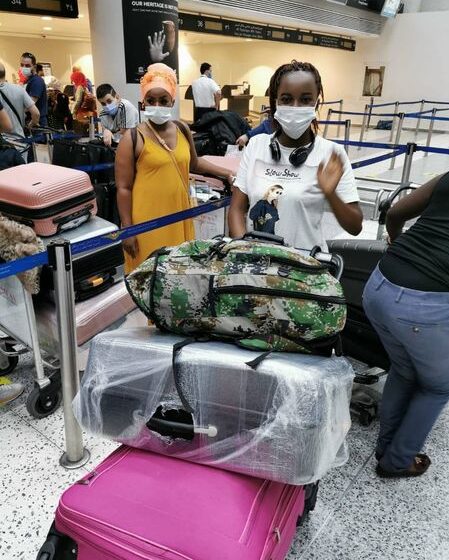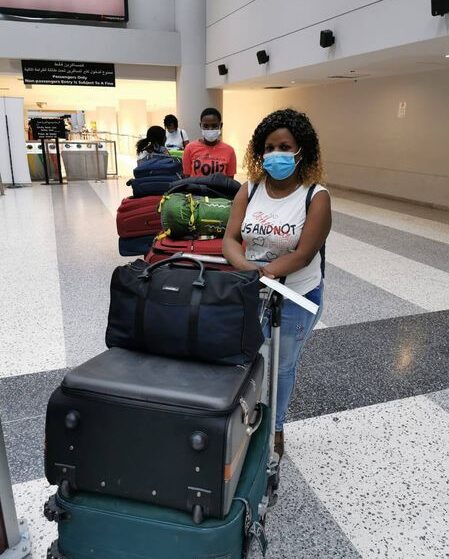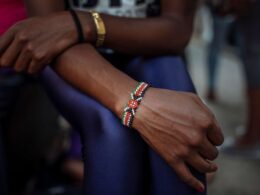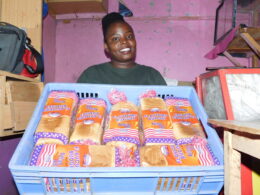Their return is often met with a mixture of reactions: relief that they had returned safely, but also shame and social stigma for those who return without adequate savings
31/03/2021
Nasambu ( not her real name) is one of the Kenyan women migrant domestic workers who recently returned from Lebanon through the help of wellwishers after months of being stranded in Beirut without a means of income or place to live following the deteriorating economic crisis in Lebanon that had been exacerbated by the Covid-19 Pandemic and the August 4th Beirut explosion. Nasambu is grateful to be back home, she has heard too many horror stories of women who had been in a similar position as her who were not lucky enough to return home safely. Nasambu had travelled to the United Arab Emirates (UAE) as a migrant domestic worker after being recruited through a foreign recruitment agency. She had been struggling to find work to be able to provide for her 2 children.
Whilst in the UAE, around 4 months into her contract, her employer, a Lebanese family, decided to Lebanon and offered to bring her along. In Lebanon, she fell ill and went into a coma only to wake up a month later and find herself abandoned by her employer with just her passport and belongings in a foreign country. For many months, Nasambu had been surviving through the support of wellwishers and other women migrant workers until the situation became unbearable for many of them. Nasambu recounts how for many other women migrant workers who had been abandoned by employers or escaped from them because of abuse and exploitation, destitution was a real risk and some had resorted to engaging in sex work as a way of earning an income.
Indeed, when a few Kenyan women sought help from the consulate in Beirut, they alleged that they had been encouraged by the consulate to ‘prostitute themselves’ to raise money for flights and visas back home.Nasambu returned home with no savings, no income and six months pregnant. Besides her financial difficulties, returning home pregnant has led her to face rejection from her family, and double the shame and social stigma from the wider community. For many returnees like Nasambu, returning home is never the end of their woes leading many to consider re-migration. In the conclusion of International Women’s Month, we want to reflect on the experiences of women MDWs returnees and perhaps how gender informs/shapes these experiences.
Migrant domestic workers are governed by a sponsorship system that allows employers to have total control of the workers
The increased migration of workers from Kenya to the Middle Eastern countries has been primarily driven by the search for better economic opportunities and the rising demand for labour - particularly within the care work sector. Domestic and care work remains highly gendered leading to the increased feminisation of labour migration - more women are now migrating compared to men. In 2021, the Star reported that there's a market demand for the foreign recruitment of 12,000 women domestic workers every month.
According to the 2019 population census Kenya has more women (24 million) than men (23 million). However, reports indicate that on average women earn less than men and engage in unpaid care work including cooking, cleaning and caring for children and the elderly further limiting their ability to pursue opportunities and compete fairly in the local labour market. Many women from low income backgrounds are unable to continue their education because of inadequate funding which means engaging in domestic work and other forms of informal work such as small scale businesses are the only viable options for them. However these opportunities are rarely adequate to support their families for whom they’re the breadwinners therefore making migration a viable alternative.
Unlike other professions in these countries, migrant domestic workers are governed by a sponsorship system known as Kafala that allows employers to have total control of the workers which means that they cannot change jobs, quit jobs, or leave the country. Many migrant domestic workers are consequently trapped in abusive and exploitative conditions and the majority prefer to return home to their countries of origin. For many, the goal is to move abroad, earn decent wages and eventually return home with better living conditions. Some have been lucky to get decent employers who pay them on time and do not exploit and abuse them. These women are able to send remittances home and have managed to support their families, the money being mostly used for paying for their children’s education, building houses or even investing in assets such as land. But what happens to the women who return back without meeting the goals and how do they reintegrate into their communities?
Kenya lacks return and reintegration programmes for returnees and therefore many workers return with less preparedness
Their return is often met with a mixture of reactions: relief that they had returned safely, but also shame and social stigma for those who return without adequate savings usually in cases where the women had escaped abusive employers and subsequently ended up in detention and deported back to Kenya. In some cases, also grief. There have been incidences of migrant domestic workers dying abroad under mysterious circumstances leaving their families seeking answers unsuccessfully. In 2017, the family of a 29 year old Kenyan woman by the name of Catherine Wangechi, a migrant domestic worker in Saudi Arabia, was informed their daughter had died by suicide after four months of unsuccesfully trying to communicate with her. A cause which her family disputed.
Mary Mbela was also a Kenyan domestic worker in Jordan who was repatriated in 2018 after being badly burnt in her employer’s home. For a month, her family was not informed of what had happened to her and a few weeks after her return, she died from her injuries. These are just the cases that are documented and for many families with relatives abroad, anxiety and worry over their relative’s safe return is a serious concern. Many migrant domestic workers have shared how often they don’t tell their families about the abuse and other dehumanising challenges they’re facing abroad due to shame or a moral obligation to persevere as their families depend on them
Kenya lacks return and reintegration programmes for returnees and therefore many workers return with less preparedness. For those who are forced to return without enough savings, the lack of reintegration support from the government means they return to face the same economic precarity before their migration. This is often demoralising as many workers are the primary breadwinners in their families including relatives. Additionally for those who have been subjected to abusive and exploitative conditions whilst employed abroad, they return with trauma which combined with their economic difficulties further deteriorates their mental health. In the absence of psychosocial support from the government, many returnees grapple with stress, depression and other mental health issues on their own as they are unable to share their horrific experiences abroad with their families and friends.
Furthermore, some return to broken down relationships either with their partners, families or sadly their children who have grown up in their absence. Familial relationships that have broken down can usually be attributed to misuse of their remittances by relatives. Kenya remains a patriarchal society, but modernization has brought about changes in the traditional family practices and this amongst other factors has resulted in an increase in single parent families. Migrant domestic workers therefore make a choice of leaving their children with relatives with an assurance of regularly sending monetary support. Migrant domestic workers in the Middle East regularly have their passports confiscated by their employers severely limiting their ability to leave the country to visit their families. Additionally, some employers restrict communication in the household to the extent of regulating when phone calls happen or in some cases confiscating their phones making it difficult for migrant domestic workers to keep in touch with their families. This consequently affects their relationships with their families.
In some situations, returnees face the grim reality of not being recognized by their children or coming back to find their partners have entered into new relationships. In these cases, the women are forced to bear the burden of the social shame and stigma of these failed relationships leading to social exclusion and isolation. Their families also face ridicule from the communities when their daughters return with nothing and in some cases they become a burden to their families when they come back with long term health needs. Pregnant returnees also face a lot of shame as they are judged by their communities especially when the child is of a different race. This is associated with prostitution which in some cases may not be the case. Notably, both local and migrant domestic workers are faced with judgments when they become pregnant compared to any other professions. So does gender play a role in shaping the reintegration experiences of women returnees? Do they have a significantly harder time fitting back in than their male counterparts?
Not only are entire families and communities dependent on the labour of poorer women but also governments are seeing their earnings as an important source of revenue.
Remittances sent by Kenyan workers are currently the highest source of forex in the country making Labour migration the biggest export with a return revenue of around 30 billion every month. Saudi Arabia and Qatar, top destinations for migrant domestic workers, are some of the biggest contributors. The government’s increasing dependence on labour migration of workers particularly domestic workers as a way of reducing unemployment (currently standing at 12.7%) and enhancing their revenue is reflective of what Sassen terms the feminisation of survival. Not only are entire families and communities dependent on the labour of poorer women but also governments are seeing their earnings as an important source of revenue.
Moreover, the government also benefits through the revenue from private enterprises (around 302) that derive their profit from recruiting and exporting women domestic workers. In Kenya, these recruitment firms are required to pay an upfront registration fee of KES 500,000 for a permit which they then have to renew annually at a fee of KES 250,000. Additionally, they also have to execute a KES 1.5 million bond in a local bank for the purpose of repatriation which in many cases migrant domestic workers never benefit from. According to research conducted by ThinkTriangle, on average the recruitment fee for a Kenyan domestic worker to Lebanon is KES 210,000 from which recruitment agencies in both Lebanon and Kenya massively profit from. In this way, the burden of survival of various stakeholders is entirely placed on the backs of women workers who have very minimal labour protections and are extremely vulnerable to abuse and exploitation.
When these women escape these oppressive conditions abroad, they are rarely afforded help by their government and the recruitment agencies and when they return home, they’re subjected to scorn, ridicule and exclusion from their communities. Indeed it is an interesting dynamic in the context of Kenya being a patriarchal society where women are still subjugated, discriminated against and expected to occupy traditional gender roles. This gender inequality is reflected in the experiences of migrant domestic workers who often have limited education, early pregnancies and fewer access to economic opportunities. Some returnees with children noted how their partners had abandoned them and therefore they had no choice but to take on the role of the provider which led to their migration. Jane (not her real name), a recent returnee recounts how she came from a big family and had male siblings but nonetheless she felt the responsibility to provide for herself and her parents was placed on her and this motivated her to migrate abroad.
It is therefore fair to conclude that the negative experiences of returnees are partially shaped by the harsh societal expectations placed on women. When survival of households, communities and government is predicated on these women’s labour, their abandonment of these jobs is met with severe judgement and critique and their wellbeing dismissed. Essentially, they are reduced to simply providers of resources, objects of profit and sources of cheap labour devoid of any rights.
On a more positive note, a more nuanced analysis reveals that returnees who had become their families’ breadwinners are able to exercise more agency within their households as they become the decision makers. In this sense, gender roles and gendered power relations are subverted by this transformation of dynamics within their households and even wider communities therefore reifying the feminist idea that gender is a continuous performance. Additionally, the exposure that returnees have abroad to different cultural and economic settings means they come back equipped with newer skills and knowledge which can ameliorate their autonomy and to an extent free them of cultural expectations placed on women such as imminent marriage, etc.
Nonetheless, the various reintegration challenges that returnees face ultimately become too much and this drives many to consider re-migrating by moving to another employer or country with the hope of having luck on their side.
More stories




